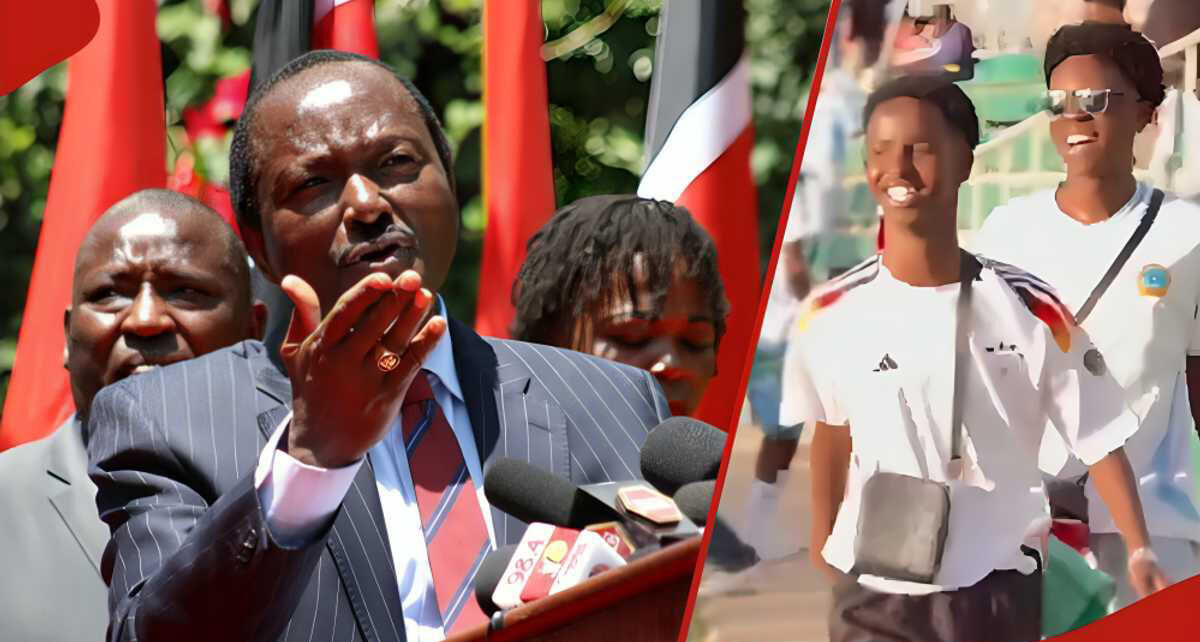The desecration of national symbols often stirs intense emotions within a country, and Kenya is no exception. Recently, a video emerged from Nyayo National Stadium showing two Somali youths trampling and rubbing the Kenyan flag after a CAF Champions League match involving Mogadishu City Club. The footage quickly went viral, sparking outrage among Kenyans across social media and prompting strong reactions from political leaders and the public.
Among the first high-profile leaders to respond was Wiper Party leader Kalonzo Musyoka. In his statement, Kalonzo condemned the act as both disrespectful and provocative, insisting that there was “nothing to investigate” since the evidence was already clear from the widely circulated video. He called for the immediate deportation of the suspects if they were not Kenyan citizens, arguing that such behavior could not be tolerated within the country. For him, allowing such an incident to pass without swift action would undermine the dignity of the Kenyan nation and its symbols.
Kalonzo’s comments reflect a broader national sentiment of anger and disappointment. Many Kenyans regard the flag as a sacred emblem of unity, independence, and sovereignty. To trample on it is seen not only as an insult to the state but also as an affront to the sacrifices of those who fought for Kenya’s freedom. In this context, calls for decisive action—including deportation, prosecution, or both—appear justified in the eyes of many citizens.
The government has also taken the matter seriously. Interior Cabinet Secretary Kipchumba Murkomen directed that those responsible be arrested, prosecuted, and, if they are non-citizens, deported. Meanwhile, the Somali government, through its ambassador to Kenya, issued an official apology and condemned the actions as “regrettable,” underscoring that the behaviour of a few individuals should not be allowed to damage relations between the two neighbouring countries.
At the heart of the debate, however, lies the question of due process. Kenya’s National Flag, Emblems and Names Act criminalizes acts of disrespect toward the national flag, punishable by fines or imprisonment. This means that, even in cases where evidence appears obvious, suspects must still be subjected to legal procedures to establish guilt. Deportation, particularly, cannot be applied arbitrarily if the accused turn out to be Kenyan citizens. In such cases, they would instead face trial under Kenyan law.
This incident highlights the delicate balance between public outrage, legal procedure, and diplomatic relations. On one hand, Kenyans are rightfully angered by what they view as a deliberate insult to their identity and sovereignty. On the other, a hasty response without adherence to legal channels could undermine the very rule of law that the flag symbolizes.
In conclusion, Kalonzo Musyoka’s demand for immediate deportation of the Somali youths captured desecrating the Kenyan flag mirrors the national mood of outrage. Yet, while swift action is important, Kenya must also uphold the principles of justice and due process. The matter, though emotionally charged, offers an opportunity for the state to reinforce both its respect for national symbols and its commitment to the rule of law. Only by carefully balancing firmness with fairness can Kenya preserve its dignity while strengthening its institutions.



